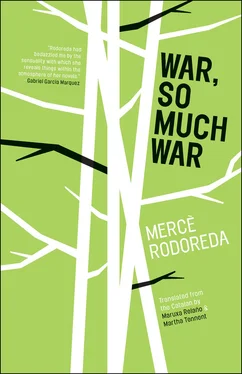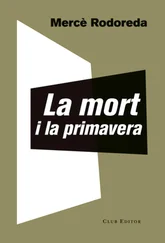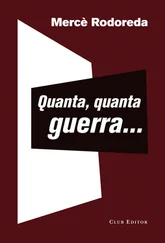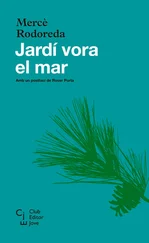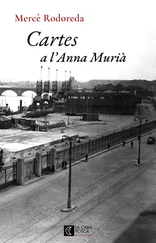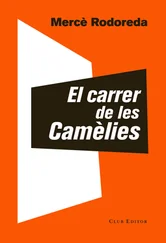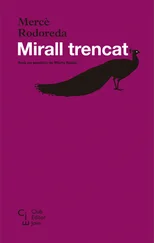WHAT ARE YOU DOING ON THE FLOOR? THE FISHERMAN WAS standing at the kitchen door looking at me. The cat had jumped on top of me. Come have some breakfast and then we’ll tidy up this mess. . What on earth? You need to disentangle your leg from that rope. I understood without fully understanding. The workbench was no longer against the wall; the medicine cabinet, its doors wide open, was bare. The empty bottles that I recalled seeing neatly lined up in rows by the door were now scattered about. The pillows that had been on the bench lay on the floor. It could not be. I had not dreamed that I slipped out during the night and a bird was pecking and pecking on a tree as I headed to the pond. I had lived all of that. I did not dream that the moon was blue, the grass damp. . The bottoms of my trousers had been wet. They were now dry, but I had felt them sodden against my legs. I had seen the sky reflected in the water. . and I still held in my hand. . what was I holding in my hand? Nothing. It was empty. And what had those stones and the shower of broken glass been? And the fall? Had the real and the imagined merged so that I was no longer able to discern what was true and what a product of my dreams?
The fire was lit, the pitcher of milk was steaming, the entire room smelled of coffee. The honey in the pot — flower juice in a glass prison, the fisherman called it — awaited a spoon, and, skewered with an iron prong, two slices of bread were toasting. The cut I had on my right thumb throbbed. I ate nothing. Did you wrestle with a wolf last night? Don’t tell me your dream if you don’t want to, but I’d like to hear it. I’d like to know why you fell off the bench, and most of all why you slept on the floor, and why you didn’t get up from there. Go on, tell me. I never dream, I lied.
We worked the whole day without pause, tidying up the toolshed and bringing in the wood from the forest. Why don’t you stay? I shrugged my shoulders. You’ve seen for yourself that it’s comfortable enough around here. I could fix up the shed for you and build another one to house all these oddments. You seem lost and I sense you could use a guiding hand. You’re very young. I was inclined to tell him that I enjoyed nothing more than wandering through the world lost. Doing as I pleased no matter how things turned out, with no one giving me any advice. Seeing the sky, the forests, experiencing fear, contemplating the night and having it for a roof.
Toward evening, sitting in front of the house, a strawberry and saffron sunset before us, he again asked me to stay. I like you. It would please me if you would be my son. I like you because you sometimes appear older than your age and at other times you seem like a child. When I didn’t respond, he asked me to tell him about my life. Won’t you? I took a while to reply, my whole being enthralled by the saffron and strawberry hues. I did not want to say anything that did not come from my very core. I closed my eyes for a moment to disentangle myself from the twilight sky; I had to think before speaking. My life is my own, I began, placing my hand on my chest. A few months ago, I don’t know how many, I still had a pocket knife with a fork, spoon, corkscrew, and screwdriver that my father had given me, but I gave it away. And now the only thing I have is my own life. If I speak about it, it escapes, I lose it. He gave me a pat on the back, almost laughing as he did so. I know, I added, that all lives are more or less the same in the essentials. He thrust his head back and closed his eyes, leaving just a slit open to spy on whatever it was he wanted to see. Don’t make me laugh. What will you do, restlessly drifting from place to place? Do you want to end up sleeping on the street or in a church portico when you are an old man? I don’t care. I want to roam the world. Be from everywhere and nowhere. I’ve only just begun to see things, and it makes my head spin to think of what there is still to be seen. So many towns, so many paths. . He again patted me on the back. And, if in the end you have seen all the villages in the world, what then? Like the lives you spoke of, they too are more or less the same: with straight or winding streets and houses piled one on top of the other. What is important, I responded, is the eye we cast on these villages. Yes, of course, and the same goes for how we look at people, but the moment will come when you will have a false life on your hands. You, what do you have inside? A garden or an inferno? A bit of both. It depends on how the wind blows. And, without knowing exactly why, I asked him: What does it mean to be like Cain? Until then he had spoken without looking at me, but the question made him turn his head. What do you mean? Just that: What does being like Cain mean? Do you mean to tell me that you don’t know the story? I know God first punished him and then protected him. When I made my mother cross she would say I reminded her of Cain. And this mark here on my forehead. . What a question to ask. Everyone knows that Cain killed. . but some people regard him as someone who seeks knowledge, who never relents, who lets nothing stop him, who wants to know everything there is to be known. What a question to ask, he added, shaking his head. I left home so that I could encounter new villages, meet people, and because I was tired of my mother. . and nothing could have stopped me. And also so I could go off to war. Although I’ve had the war close-at-hand, I can’t say I have experienced it, because I fled from it as often as I could. The fisherman rose. Well, I’m afraid you’re late. You better hurry if you still want to find it. Let’s have dinner. I followed him. He turned around before entering the house. Oh, and whenever you want to go, just go. Don’t say anything. I don’t like goodbyes. You’ll find everything you need — clothes and food — in the shed.
I WALKED FOR A LONG TIME. I TRAIPSED FROM ONE VILLAGE TO the next, from one path to another. Every road was deserted, every house destroyed. Early one morning I tripped over a dead dog; it had a piece of cardboard around its neck with some words that had been smudged by the rain: “Follow this dog. He will lead you to me. I’m wounded.” Occasionally, I would encounter men coming toward me, emaciated, with famished faces, holding each other up, their feet and legs wrapped in rags bound with rope, and I would take a different route. On one occasion, an aircraft flew by overhead three or four times, so low that the pilot must have seen me even though I ducked. But I wasn’t worth a bullet, much less a bomb. A bell tower in what was left of a village gave me shelter. That arrow that surged skyward accompanied me for a while, and after leaving it behind I turned around to look at it. A clutch of deranged creatures leapt out of the bushes, brandishing guns, and fled in the direction of a hill shouting “Kill ’em! Kill ’em all!” Until I found myself standing by a wide river I had never seen before, its banks bombed and strewn with bodies, as though the dead had been assembled there and piled on top of each other, ready to be moved somewhere else. Dead men who seemed to be asleep, on their sides, their legs drawn up; dead men with eyes open to the sky, dead men without legs, without arms. . skeletons of soldiers with bones picked clean by the birds. And, scattered among the dead, charred upturned trucks, destroyed machinery, tanks with the dead driver still inside the gun turret. A burned hand with curled fingers next to a rifle. Tents — and bits of tarpaulin from tents — being winnowed this way and that by the wind. Bombed bridges swept downstream by the river, pieces of wood still gripping the shore, ravaged fields of thyme. In a trench (there were so many of them, deep, like the tracks of giant snakes), three dogs scurried away on hearing me, their tails low, but a skinny, grungy one stood its ground. And above so much death, the flight of large birds with long, featherless necks. A line of crows were preening their wings and chests on an airplane wing that was lodged in the ground, surrounded by rowboats and charred wood. I raised an arm to drive them away. Some lazily took flight, but three remained, perched on the half-buried airplane that rested between the bank and the shallows of that smooth-flowing river, whose course was only occasionally disturbed by wooden planks from bridges. And, pervading everything, the stench of death.
Читать дальше
